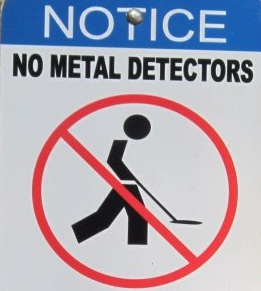We received this letter today and thought in light of recent events many of you would be interested in reading yourself:
Dear FPAN Northeast staff,
Recent articles in the St. Augustine Record about artifact collecting make it clear that protection of our archaeological sites is an on-going and often strained effort. Though the articles offered an “archaeologist’s viewpoint”, they did not illuminate the broader commitment that our communities have to the public value of archaeological sites.
This commitment is clearly observed in the existence of research and education programs like FPAN and the City of St. Augustine’s Archaeology Program, and in the many volunteers (or just interested citizens) who support such programs. And in a more preventative sense, the commitment is also reflected in the laws enacted to protect these publically-owned resources.
While metal detecting to find lost items and random, isolated objects is a wonderful source of recreation, metal detecting or digging to methodically collect objects from an archaeological site on public lands in St. Johns County is a crime.
On state-owned and controlled lands, including sovereignty-submerged lands, digging for artifacts without a permit from the Division of Historic Resources is a third degree felony (Chapters 267.061 and 267.12-13, Florida Statutes, and Rule 1A-32 of the Florida Administrative Code). Digging on Federal land, such as the beaches within Fort Matanzas National Monument, also requires a permit, and illegal digging is a felony offense with first time offenders potentially subject to a $20,000 fine and a one year jail sentence (Archaeological Resources Protection Act of 1979). Finally, St. Johns County’s cultural resource laws make it illegal to knowingly disturb an archaeological site on county-owned or managed lands (Land Development Code 3.01.07), and our County park laws prohibit digging on any archaeological site (Ordinance 2005-114). These laws apply to all our beaches, parks, waterways and recreational and conservation lands.
Far from restricting, these laws were created to protect the public’s rights to their heritage from people who would take it from them for personal gain. Many curiosity seekers or history buffs discover sites on public lands without removing artifacts and report them to those who work to protect the publics’ resources. Their exciting recreational activity leads to public benefit and gives us all a long term return on our national history and our investment in public lands.
Of course, education will ultimately be the most important tool and your staff’s efforts in this arena have been outstanding. As an FPAN Board of Directors member, it has become clear to me that the Northeast office is helping to set the bar for the State. Thank you and please keep up these innovative and effective programs!
Robin E. Moore, MA/RPA
St. Johns County Historic Resources
Thank you Robin! We've been sending out lots of links and resources this week. To view original Record articles and responses, see:
Updated!
January 24th City Resolution for Protection of Artifacts
Other resources we've sent around this week on archaeology ethics:
Dr. Della Scott Ireton's post on ethics and treasure hunting
Advisory Council on Underwater Archaeology - Ethics Press Kit
Society of American Archaeology's Code of Ethics
Society of Historical Archaeology's Code of Ethics
Register of Professional Archaeologists Code of Conduct
UNESCO 2001 resolution against treasure collections
Text: letter by Robin Moore with supplemental text by Sarah Miller
Image: Sarah Miller and Amber Weiss, FPAN staff
 |
| Fragile maritime resources recorded in Ponte Vedra, St. Johns County. |

